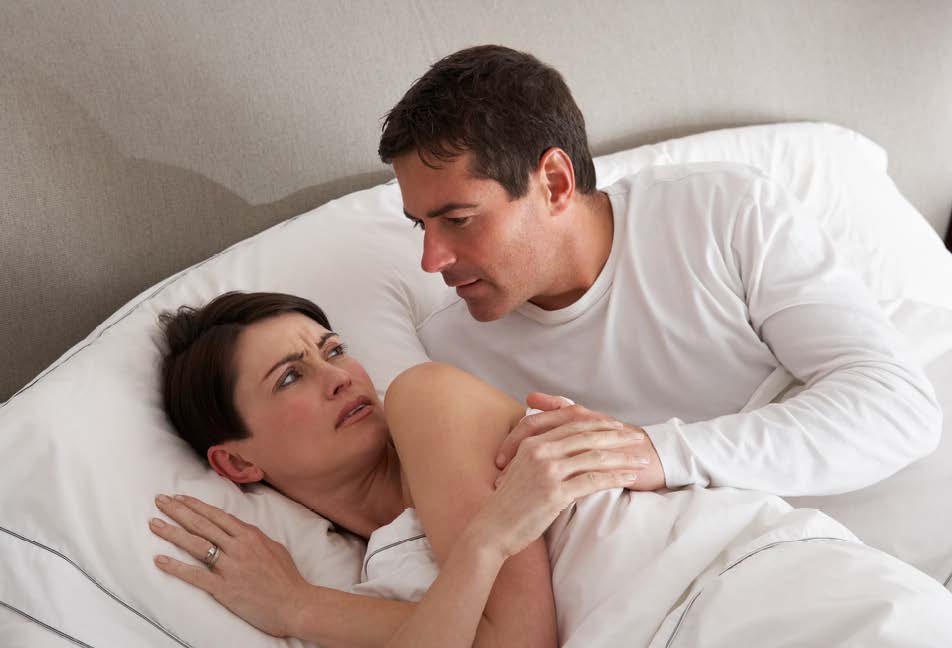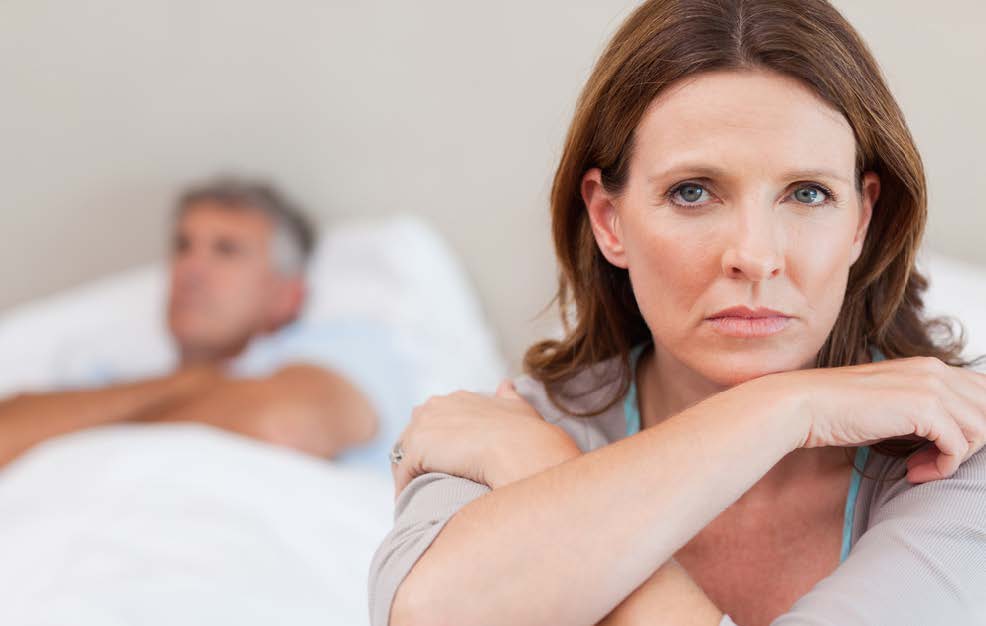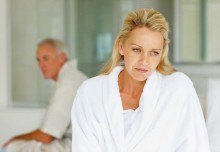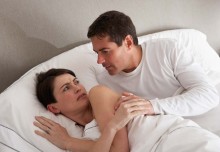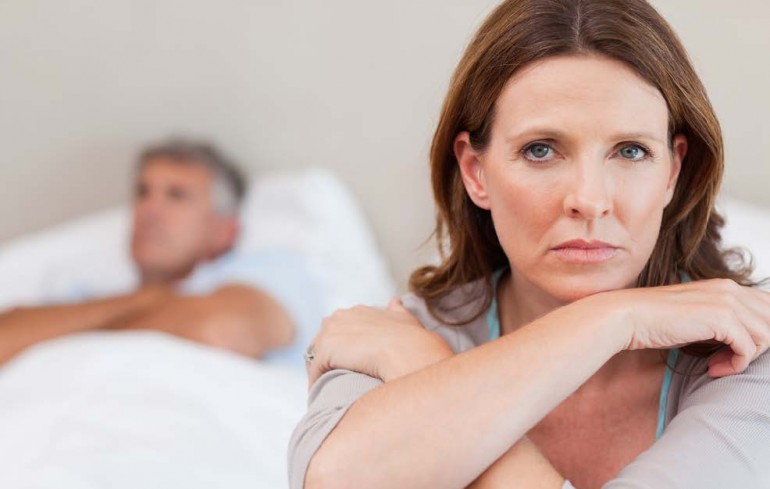
Female sexual dysfunction is common. Most can be improved or cured by talking with a knowledgeable health care provider.
An interview with Sheryl Kingsberg, PhD, Chief of Behavioral Medicine at University Hospitals Case Medical Center and professor in Reproductive Biology and Psychiatry at Case Western Reserve University and a world renowned expert in sexual medicine
Dr. Mache Seibel: How common is female sexual dysfunction?
Dr. Sheryl Kingsberg: Believe it or not, nearly 50% of US women will report having a sexual complaint or a problem. When we think about a true medical diagnosis of female sexual dysfunction, it affects nearly one in ten women. Just look around in a roomful of a hundred women and ten of you are sitting there wondering, am I the only one?
 Dr. Seibel: It’s always that way when you have an embarrassing topic. Things like sexual dysfunction and loss of urine are embarrassing and often go undiscussed with the persons who can most help them which is their healthcare providers; but they don’t say anything.
Dr. Seibel: It’s always that way when you have an embarrassing topic. Things like sexual dysfunction and loss of urine are embarrassing and often go undiscussed with the persons who can most help them which is their healthcare providers; but they don’t say anything.
Dr. Kingsberg: It’s true. Women are hoping that their physician or their healthcare provider will bring it up, and the healthcare provider is hoping it doesn’t get brought up; because, oftentimes, they’re not trained to address these concerns. And so, it’s sort of this unspoken elephant in the room, but in reality, it is the healthcare provider’s duty and responsibility to manage the sexual health of women. The World Health Organization actually lists sexual health as a basic human right. So, for the women out there who are wondering should I bother my healthcare professional? Absolutely! If you have a healthcare professional who is uncomfortable bringing it up, I have to say, find another one in your healthcare system.
Dr. Seibel: What are some of the things that can cause sexual dysfunction in women?
Dr. Kingsberg: Sexual dysfunction is sort of an overarching big word for six different sexual problems. The first one and the most prevalent is what we call Hypoactive Sexual Desire Disorder, or in layman’s term low sexual desire or the lack of interest in being sexual. This is when there is persistent loss of interest. I don’t mean it’s been a bad week or there’s a period of time after you have a baby.
Dr. Mache Seibel: Lost your mojo.
Dr. Kingsberg: In sex, desire is kind of complicated. Think about it as having three parts:
- Drive, which is the biological piece of desire. It’s when your body signals its hunger to be sexual.
- A cognitive piece, which are your values and cultural beliefs, and
- Motivation. Motivation reflects all of the interpersonal and psychological aspects that bring a woman to want to be sexual with or without such drive. So, when a woman walks into my door or into her healthcare professional’s door and says, “I don’t have interest. I’ve lost my desire.” It’s very important to think about whether this is about your basic biologic hunger or whether there’s something going on with your life that’s draining your interest in being sexual with a given partner.
Women are hoping that their healthcare provider will bring it up, and the healthcare provider is hoping it doesn’t get brought up
Dr. Seibel: These are very important distinctions that have to be teased out. Desire isn’t one thing. It’s actually one feeling derived from three different parts. Dr. Kingsberg: Yes. That will very much help you and your clinician determine which treatment has to go because when there’s a drive issue it’s important to look at what’s your health status, what medicines are you on, what else could be going on psychologically…
Dr. Seibel: Menopause.
Dr. Kingsberg: Right, menopause certainly. We know that 50% of testosterone, which is important for drive is produced in the ovaries, so as your ovaries are shutting down which is often long before 50, by the way, you’re starting to notice this unless you have a surgical menopause. So, that certainly can impact your drive. That’s the biologic piece. Then, the cognitive piece and the motivation piece could be about your relationship. You can have all the drive in the world but if you’re not really happy in your relationship, no amount of testosterone, for example, is going to bring that. So, you need to think about what’s biologic and what’s psychological. Everybody would like a simple fix in a pill, honestly, but not everything is that quick a fix and you need to tease out the fact that desire is complicated but not overwhelmingly so.
Dr. Seibel: Women are complex.
Dr. Kingsberg: We are complex. Sexuality is a little complicated, but that’s what makes it interesting.
Dr. Seibel: Absolutely.
Dr. Kingsberg: So, that’s the first sexual disorder and the most prevalent one. If the ones that have some difficulty, Hypoactive Sexual Desire constitutes 10% of the total of those women. The second one is Sexual Arousal Disorder – you have desire but either subjectively you can’t perceive that your body is responding, or objectively, your body really isn’t lubricating although there’s the vaginal swelling that we typically expect once you have desire. It tends to be a little bit more physiologic, but in order to have arousal problems, you need to first have desire but then the arousal doesn’t work.
Dr. Seibel: You want to, but things don’t seem to crank up for you.
Dr. Kingsberg: Yes. You brought up menopause; that is often the time when arousal is more difficult or slower. Many menopausal women who used to expect that they’d have desire and then their body would respond within seconds, find that now it takes a few minutes and they need to be aware of that and plan accordingly. Because if you try to, for example, have penetration before your body is lubricated and there’s blood flow to the vagina, that could cause some difficulties and discomfort.
Dr. Seibel: So, with a little education and re-evaluation, someone for instance in menopause or for other reasons as well, will overcome her inability to get aroused if she is given enough time.
Dr. Kingsberg: Yes, absolutely. This is not a deal breaker; this is knowing your body and managing it accordingly. Also, there can be some fringe benefits in that it forces couples to slow down, take their time and engage in a little bit more caressing and sensual foreplay and that’s got to be good.
Menopause is often the time when arousal is more difficult or slower
Dr. Seibel: Absolutely. What percentage does this affect?
Dr. Kingsberg: About 5% of women have arousal problems.
Dr. Mache Seibel: So, probably a lot of women that are initially bothered by that eventually figure out; hey if I just take my time or if I can get him to take his time, this thing will work its way out.
Dr. Kingsberg: Yes. That’s very much true. The third problem is, actually more of phobia than anything, but it’s called Sexual Aversion Disorder. I bring it up because it’s a little different in that it may look like low desire, but in fact, is really about an almost phobic avoidance of sexual activity; so a panic fear or even revulsion to the idea of being sexual. This is a much lower prevalent problem but it does exist. So, for women who are sort of confused by it, they need to know that women with low de- sire wants to want sex, and women with aversion disorder may actually have plenty of drive but the idea of being sexual creates panic and avoidance.
Dr. Seibel: Would that be someone who may have been sexually assaulted in the past or something like that?
Dr. Kingsberg: It definitely could be. That is certainly a predictor of sexual aversion disorder. But sometimes, it even happens spontaneously just like other phobias occurs sometimes without any precipitating factors, so it can go either way.
Dr. Seibel: I was struck that recently the journal obstetrics and Gynecology put forth a discussion about female sexual assault and pointed out that one in three women will be sexually assaulted in her lifetime, which is astoundingly terrible information; but nonetheless, I would think with that level of history in the background that it would contribute at some point potentially in some of these arenas.
Dr. Kingsberg: Yes, in some they do. But just think about the numbers you’ve just said: between one in three, and one in four women at some point in their life will be sexually assaulted. But one in three to one in four women don’t have a sexual dysfunction. So, most women despite having been assaulted will do fine with their sexual functions.
Dr. Seibel: That’s very encouraging. I mean, it’s a terrible thing, but its good for people to know that is not the end of intimacy for them and it’s not the end of the opportunity for closeness and for normal sexual experience just because of that bad thing.
Dr. Kingsberg: That’s absolutely true. You are not stuck in the past.
Dr. Seibel: Great, that’s wonderful.
Dr. Sheryl Kingsberg: So, I gave you Hypoactive Sexual Desire Disorder, Arousal Disorder, Aversion Disorder, and then Female Orgasmic Disorder (FOD) or Anorgasmia; you can call it either one. That’s obviously the difficultly to achieving an orgasm; either it is what we call primary or lifelong and that women have never ever had an orgasm, or we call it secondary or acquired – meaning that at some point women were able to reach orgasm but now they cannot or if they can it’s with great difficultly.
Once again, you think about menopause as a cause of that for many women, as a loss of genital sensitivity with loss of estrogen certainly can contribute to that. But it is again, fairly prevalent about just under 5% of women with sexual problems will have anorgasmia.
Dr. Seibel: Do you think as a result of less women taking estrogen over the past ten years after the Women’s Health Initiative (WHI) that low estrogen is a major culprit, or do you think that the high prevalence of women – and men for that matter – taking antidepressants and other medications has caused a medication-driven situation?
Dr. Kingsberg: I would say yes and yes and yes. I think the WHI and the fear of taking estrogen has been problem in that women have confused the idea that all estrogens are alike and they are forgetting the fact that they can and many probably should be on a topical or vaginal estrogen because at some point even if not at the moment of menopause but five, six, seven years later, vulvar vaginal atrophy is going to be a consequence of a woman without estrogen.
Dr. Seibel: At the North American menopause Society meeting an entire seminar was on this topic. About 85% of women will eventually have vulvar vaginal atrophy (thinning of the vaginal and vulvar tissues). it’s a huge problem with aging.
Dr. Kingsberg: It is a huge problem because women have been so frightened by the idea of systemic hormones; and we know that data has changed since it first case out in 2002. But also, people don’t pay attention to the fact that local estrogens can be a nice option for women. Certainly, the North American menopause Society has its position statements saying first line treatment should be lubricants and then long-acting moisturizers. But for women whose symptoms are not resolved by that, a local estrogen is really a very nice option. Talk to your healthcare professional about it. I think that’s very important for women who have arousal disorder and pain with sexual intercourse and difficulty with orgasms. Women in menopause should also check to find out if they have vulvar vaginal atrophy.
The last two are dyspareunia and vaginismus. Dyspareunia is pain with any kind of sexual penetration. Oftentimes, it is really a symptom more than a diagnosis, because pain would be caused by many things. Some women will have pain at the entrance of the vagina that could be due to vulvar, vaginal atrophy or could be due to other skin conditions where some women would have deeper pain that could be caused by pelvic effusions or endometriosis, so we really look at that as a symptom. Last but not the least is vaginismus. Vaginismus really reflects the inability to have penetration when it is wanted. Essentially, it’s an anxiety disorder where the vaginal muscles tighten up in the anticipation of pain with penetration regardless of what the penetration is. The reason that it is a disorder is that it’s wanted penetration. This actually can extend to actually going to a pelvic exam.


